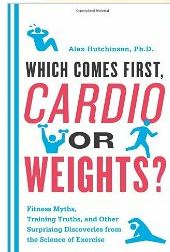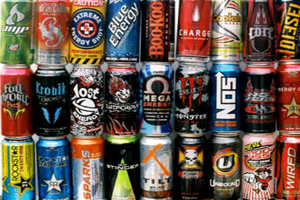July 9th, 2012 by Dr. Val Jones in Book Reviews, Health Tips
1 Comment »
 I just finished reading a great little book called, “Which Comes First, Cardio Or Weights? Fitness Myths, Training Truths, And Other Surprising Discoveries From The Science Of Exercise” by Alex Hutchinson, Ph.D. I’m very grateful to Alex for patiently sifting through over 400 research studies in a quest to answer (with evidence, not subjective opinion) some of our most nagging exercise questions.
I just finished reading a great little book called, “Which Comes First, Cardio Or Weights? Fitness Myths, Training Truths, And Other Surprising Discoveries From The Science Of Exercise” by Alex Hutchinson, Ph.D. I’m very grateful to Alex for patiently sifting through over 400 research studies in a quest to answer (with evidence, not subjective opinion) some of our most nagging exercise questions.
Alex is the perfect guy to do this exercise myth-busting as he is a competitive runner, professional journalist, and has a Ph.D. in physics. His writing is crisp, uncluttered, and bears the understated humor of a Canadian. To be honest, I enjoyed his book so much that I was contemplating blogging about most of his conclusions. However, I don’t want to teeter on the edge of copyright infringement, so I’ll just provide you with some highlights from my favorite sections of the book:
1. Do compression garments help you exercise? I’ve wondered this many times as I jiggled my way down the road on a long run. I’ve always liked the theory behind tight outer-garments, that they reduce unnecessary movement during running, thus making one’s movement more efficient and reducing the bounce and drag on muscles and skin. They may also help with blood return to the heart and reduction in peripheral edema, speeding recovery from exercise. Believing the plausibility of the argument, I have indeed sprung for some rather expensive running tights.
So what does the scientific literature have to say about compression garments’ role in exercise? Apparently there is nothing conclusive yet. Small studies have shown no clear improvement in exercise economy, athletic power or endurance, or recovery from exercise. The only measurable benefits appear to have occurred in those who believed that the compression garments would help their performance. A nice reminder of the importance of the “mind-body” connection in athletic pursuits. Bottom line: if you like how you feel in compression garments, by all means wear them. But don’t expect any dramatic improvements in anything more than your jiggle factor.
2. Will sitting too long at work counteract all my fitness gains? The short answer to this question is: possibly. I was surprised to note that at least one large study found that sitting for more than six hours per day increased one’s risk of death by 18-37% regardless of how much exercise one performed in the other eighteen hours of the day. Long periods of sitting appear to be quite bad for your health, so getting up and moving around every hour or more is important if you have a sedentary job or lifestyle.
3. Does listening to music or watching TV help or hurt my workout? Listening to faster-tempo music can result in increased exercise effort (in many cases completely unconsciously), while TV-watching usually results in a reduced exercise effort. This is because watching videos requires visual attention and subtle changes in balance and movement occur to accomplish it.
4. Will stretching help me avoid injuries? As a person with limited flexibility, I found this section of the book to be quite comforting. As I have blogged previously, stretching has not been shown to reduce the risk of injury or post-exercise soreness. In fact, it can decrease power and speed for certain athletes, though it is important for those who intend to perform great feats of flexibility (such as gymnastics).
5. Should I take pain killers for post-workout soreness? Interestingly, non-steroidal anti-inflammatory drugs (NSAIDs) are not particularly effective in reducing post-exercise pain and can even interfere with muscle repair. NSAIDs block prostaglandins, which are important in collagen synthesis. While NSAIDs are useful in reducing inflammation and swelling in acute injuries (such as an ankle sprain), general muscle soreness isn’t a good reason to pop some ibuprofen.
6. Will drinking coffee help or hinder my performance? I’m one of the few people I know who doesn’t drink coffee, so I was surprised to discover that I may have been missing out on an important exercise enhancer. According to decades of research, caffeine is likely to improve your exercise performance. Studies have shown that pure caffeine (not necessarily in its coffee form) enhances sprint performance as well as endurance activities up to two hours. In 2004 the World Anti-Doping Agency removed caffeine from its list of restricted substances, so expect to see some caffeinated athletes in this summer’s Olympics.
7. What’s the best way to breathe during exercise? If you’ve ever marveled at your own panting, you’ve also probably wondered if there is a more efficient way to breathe – or at least a less embarrassing way. The answer is no. Studies have shown that people who consciously work to make their breathing less labored expend more energy and get less oxygen in the process. So, keep on breathing the way your body wants to… you’re naturally more efficient at it than you think.
I hope that these little tidbits have whet your appetite for more of Alex’s excellent insights. I have fully equipped myself with fast-paced music and a little caffeine, as I move my inflexible, jiggly, panting self down the road on another long run.
August 6th, 2011 by John Mandrola, M.D. in Health Tips, True Stories
No Comments »


Dehydrated, cramped, limping? on a bike. Road nationals 2010.
People who exercise outdoors face a new threat.
It’s unrelenting.
Consistent.
Inescapable.
Perhaps, even more dangerous than distracted or mean motorists.
It’s the heat. Gosh, is it hot. If only I had a dollar for every time I heard someone say, “Doctor M, you aren’t riding in this heat; are you?”
Well…Other than the fortunate souls smart (or lucky) enough to live in cooler climates, most of us are facing an extreme wave of hotness. As a Kentuckian, I live in the epicenter of this summer’s cauldron. Louisville sits in a wind-protected valley alongside the heat sink that is the Ohio River. Think hot and steamy.
The excessive heat smacked me hard last evening. Normally, my highly-veined skin and northern European heritage serves me well in the heat. But last night, while riding in sight of our city’s skyline, it started: My mouth grew dry and my breathing labored. And why was that helmet feeling so tight? Next came the sensation of tingles—not the pleasant kind of tingles, like when your teenager hugs you. And then came the deal-breaker: chills. I stopped, swallowed my pride and called for a ride home. (Here’s an always for you all: When it’s ninety degrees out and you feel cold–stop exercising, immediately.)
After last night’s brush with heat exhaustion, I thought it reasonable to ramble on about the dangers of exercising in the heat. And of course, I will offer some nuggets of wisdom for beating the heat. Read more »
*This blog post was originally published at Dr John M*
April 14th, 2011 by admin in Health Tips
No Comments »


At a Harvard Medical School talk on migraine and food, a nutritionist from Harvard-affiliated Beth Israel Deaconess Medical Center delivered a message that people in the audience probably didn’t want to hear: “There are no specific dietary recommendations for migraine sufferers,” said Sandra Allonen. But she did have some advice to offer—and she emphasized that the connection between food and migraine is a very individual one.
Several foods have been associated with triggering migraine. None of them has been scientifically proven to cause migraines, explained Allonen, but many people report a link between eating these foods and getting a migraine. Possible migraine triggers include: Read more »
*This blog post was originally published at Harvard Health Blog*
January 9th, 2011 by admin in Better Health Network, Health Tips
No Comments »

 By Scott Gavura, BScPhm, MBA, RPh for Science-Based Medicine
By Scott Gavura, BScPhm, MBA, RPh for Science-Based Medicine
My stimulant of choice is coffee. I started drinking it in first-year university, and never looked back. A tiny four-cup coffee maker became my reliable companion right through graduate school.
But since I stopped needing to drink a pot at a time, an entirely new category of products has appeared — the energy drink. Targeting students, athletes, and others seeking a mental or physical boost, energy drinks are now an enormous industry: From the first U.S. product sale in 1997, the market size was $4.8 billion by 2008, and continues to grow. (1)
My precious coffee effectively has a single therapeutic ingredient, caffeine. Its pharmacology is well documented, and the physiologic effects are understood. The safety data isn’t too shabby either: it’s probably not harmful and possibly is even beneficial. (I’m talking about oral consumption — no coffee enemas. Please.) In comparison, energy drinks are a bewildering category of products with an array of ingredients including caffeine, amino acids, vitamins, and other “natural” substances and assorted “nutraceuticals,” usually in a sugar-laden vehicle (though sugar-free versions exist). Given many products contain chemicals with pharmacologic effects, understanding the risks, signs of adverse events, and potential implications on drug therapy, are important.
So are energy drinks just candied caffeine delivery systems? Or are these syrupy supplements skirting drug regulations?
The Message
The ads are seductive. Who doesn’t want more energy? Who doesn’t want their mind and body “vitalized?” And don’t we have time-starved lifestyles? Initially envisioned for athletes, energy drinks are now marketed mainly towards teens and young adults, where uptake has been dramatic. Cross-promotion with extreme sporting events, and creating names like “Full Throttle,” “Rockstar,” and even “Cocaine” burnish the “extreme” image. The market is now segmented further with products targeted at women, vegetarians, diabetics, celiacs, and more. However you identify yourself, there’s probably an energy drink developed with you in mind. Read more »
*This blog post was originally published at Science-Based Medicine*
October 8th, 2010 by RyanDuBosar in Better Health Network, Humor, News, Quackery Exposed, Research
No Comments »

 Nurses and doctors depend on coffee to perform their jobs the most of any profession, reports a survey.
Nurses and doctors depend on coffee to perform their jobs the most of any profession, reports a survey.
Nurses ranked first and doctors second when asked if they needed coffee to get through their day. The rest of the coffee-fueled careers were a mixed bag of white collar and blue collar positions. Among other findings:
— 48 percent of those in the Northeast said they were less productive without coffee, compared to 34 percent of Midwesterners.
— 40 percent of those aged 18 to 24 said they can’t concentrate as well without coffee.
— 37 percent said they drink two or more cups a day.
NOTE: The study was funded by CareerBuilder and Dunkin’ Donuts.

*This blog post was originally published at ACP Internist*
 I just finished reading a great little book called, “Which Comes First, Cardio Or Weights? Fitness Myths, Training Truths, And Other Surprising Discoveries From The Science Of Exercise” by Alex Hutchinson, Ph.D. I’m very grateful to Alex for patiently sifting through over 400 research studies in a quest to answer (with evidence, not subjective opinion) some of our most nagging exercise questions.
I just finished reading a great little book called, “Which Comes First, Cardio Or Weights? Fitness Myths, Training Truths, And Other Surprising Discoveries From The Science Of Exercise” by Alex Hutchinson, Ph.D. I’m very grateful to Alex for patiently sifting through over 400 research studies in a quest to answer (with evidence, not subjective opinion) some of our most nagging exercise questions.

















